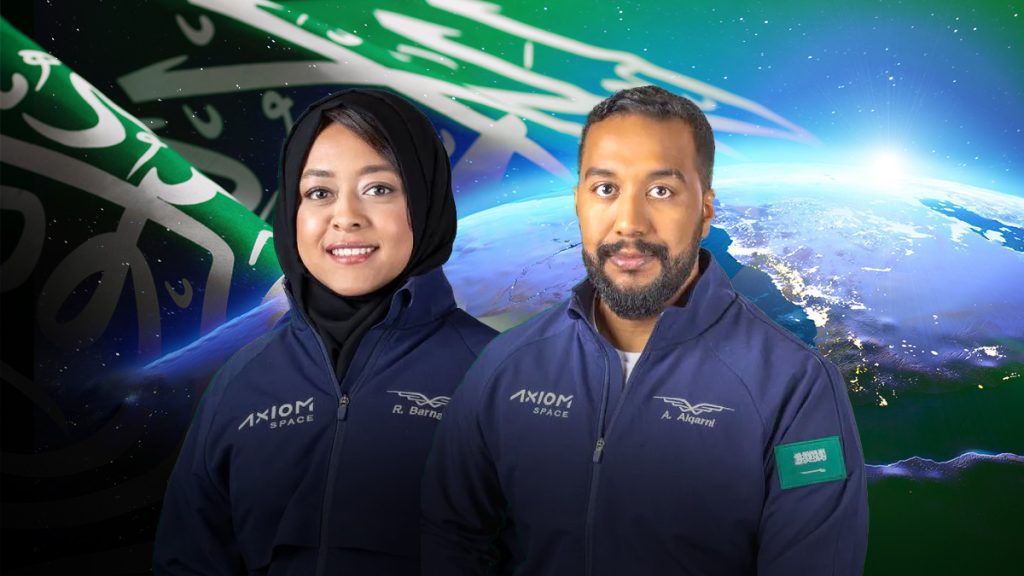
Saudi Arabia’s real purpose behind its recent significant milestones in the space sector demonstrates its commitment to diversifying its economy.
- Ax-2 operated by Axiom Space successfully docked in the ISS, allowing the crew to engage in public outreach activities and scientific research.
- The accomplishment reflects the progress made in pursuing Saudi Arabia’s Vision 2030, and it sets the stage for future advancements and aspirations in the space sector.
On May 21st, two Saudi Arabian astronauts, Rayyanah Barnawi and Ali AlQarni, started on a journey of a lifetime as members of a private crew of four. Operated by Axiom Space, the Axiom-2 mission (Ax-2) successfully docked in the International Space Station (ISS) on May 22nd. And for eight days, the crew engaged in public outreach activities and scientific research. On May 30th, at exactly 10:04 PM, CDT, the crew returned in a parachute-assisted splashdown off the coast of Florida, marking the end of the second private mission to 408 kilometers from the Earth’s surface. Though relatively new to the space sector, not only has Saudi Arabia invested significantly in the sector but also achieved notable milestones, cementing their commitment to diversify its economy away from oil. What is Saudi Arabia’s real purpose on the ISS?
One Giant Leap for Saudi Women
Born in Jeddah, KSA, Rayyanah Barnawi holds a Master of Biomedical Sciences from Alfaisal University in Saudi Arabia, as well as a Bachelor of Biomedical Sciences from Otago University in New Zealand. She has dedicated close to a decade to the Stem Cell and Tissue Re-engineering Program at King Faisal Specialist Hospital and Research Center in Riyadh.
As the first Saudi female astronaut and one of the early Saudi astronauts to visit the ISS, she has effectively made history. With such a strong background in biomedical sciences, Barnawi is poised to contribute to Saudi Arabia’s scientific advancements through the research results from this trip.
From Flying to Orbiting: A Rewarding Journey
Born in Sabt Al-Alaya, Balqarn, ‘Asir Province, Saudi Arabia, Ali AlQarni earned his bachelor’s degree in aerospace science from King Faisal Air Academy in Riyadh, Saudi Arabia. With over 12 years of flying experience and an impressive 2,387 flight hours, AlQarni is a skilled fighter pilot who has operated various aircraft. In fact, he has notably piloted the F-15SA as part of the Royal Saudi Air Force.
Inspired by his visit to NASA’s Johnson Space Center while training with the U.S. Air Force, and with the support of the Saudi Space Commission (SSC), he became an inaugural member of the Saudi National Astronaut Program. While not the first Saudi male astronaut, AlQarni has gone down in history as one of the first Saudi astronauts to visit the ISS.
A Step into the Right Direction
I would call this milestone tremendous, but it feels so much bigger than those tiny words. Ever since the announcement of the Saudi Vision 2030 in 2016, the Kingdom has sought after diversifying its economy and minimize its reliance on oil revenue. And this flight is the gateway to do so. John Shoffner, the third astronaut aboard the Ax-2, is not a traditional astronaut. He was a paying passenger. In fact, everyone on that mission, except former NASA veteran Peggy Whitson, was a paying passenger. With this, the KSA has wedged itself as a valid investor in the race for commercial trips to outer space. and to kill two birds with one stone, the Saudi astronauts went for research purposes. Cancer research purposes, of all things.
These efforts to dive into discussions from which Arabs have been historically excluded are awe-inspiring. There are generations out there who grew up thinking that they won’t reach places because of their identity. And now, thanks to Rayyanah Barnawi, Ali AlQarni, and the Kingdom of Saudi Arabia, the upcoming generations will find inspiration and hopefully, one day, themselves in these accomplishments and all the other ones to come.
Final Thoughts
This is an achievement of the highest order that accentuates Saudi Arabia’s real purpose: Prosperity. The Kingdom of Saudi Arabia is making great progress in keeping up with its agenda for its Vision 2030. When you hear diversifying the economy, your first thought is almost never the space sector. But when has the KSA been like other countries? It may not be today, but maybe, one day, our children and their children will have “road trips” into space.
Inside Telecom provides you with an extensive list of content covering all aspects of the tech industry. Keep an eye on our Community section to stay informed and up-to-date with our daily articles.